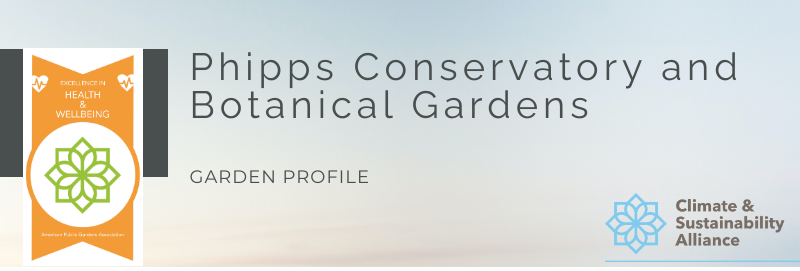
Phipps Conservatory and Botanical Gardens has pioneered a dynamic new model for employee wellness as a core driver of both sustainability and culture. Built as a repository of horticultural excellence by Henry Phipps in 1893, Phipps has evolved from the nation’s first teaching conservatory to become one of the world’s “greenest” public gardens and a leader in sustainable building and operating practices, exemplified through a multi-phase expansion of sustainable buildings on its campus. This unique, vital approach recognizes that human and environmental health are inextricably connected, and Phipps’ employees enjoy the experience of being at the forefront of the organization’s efforts to benefit both people and the natural world through buildings, practices and programs that equally value a well mind, well body and well environment.
Since its opening in December 2012, Phipps’ Center for Sustainable Landscapes (CSL) facility has served as a nucleus for human and environmental wellness operations and the principal work space for many of Phipps’ employees. The project team found inspiration and direction for the facility in the International Living Future Institute’s Living Building Challenge, which requires that a building generate all its own energy, capture and treat all its own water, and submit to stringent material compliances to ensure a healthy environment. On what was once a paved-over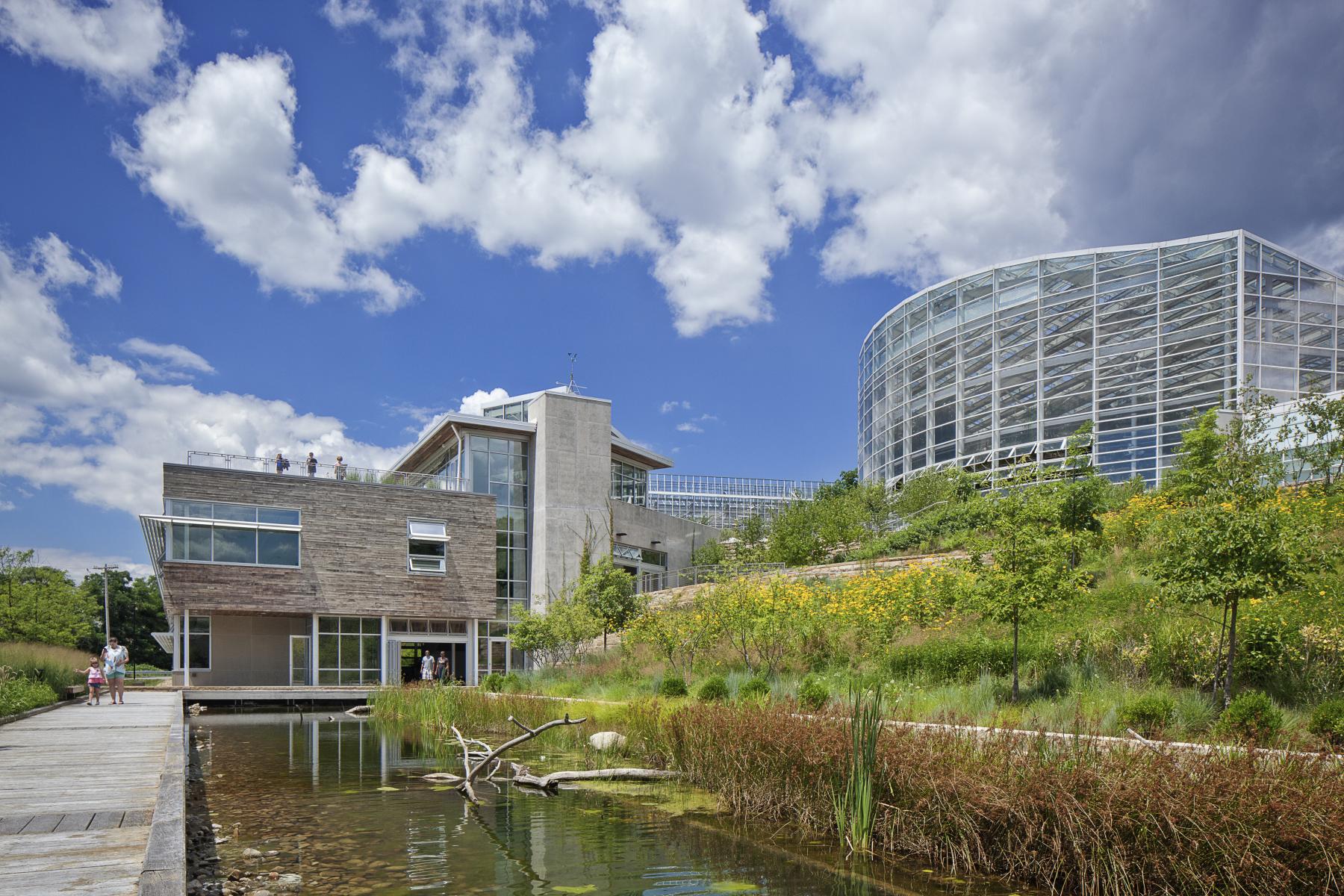 Public Works yard with portions classified as a brownfield, employees are now greeted each morning by 1.5 acres of green space with 100 native plant species from a range of ecosystems. The biodiverse plantings provide food, shelter and nesting opportunities to wildlife and border a 4,000 square-foot lagoon that is fed by roof runoff and populated with native fish and turtles.
Public Works yard with portions classified as a brownfield, employees are now greeted each morning by 1.5 acres of green space with 100 native plant species from a range of ecosystems. The biodiverse plantings provide food, shelter and nesting opportunities to wildlife and border a 4,000 square-foot lagoon that is fed by roof runoff and populated with native fish and turtles.
Photo above: Center for Sustainable Landscapes facility at Phipps. Credit: Denmarsh Photography, Inc.
The most significant results-based performance metric for Phipps’ wellness efforts to date comes in the form of the WELL Building Standard.® Created through seven years of collaboration with leading physicians, scientists and industry professionals, WELL is the world’s first performance-based certification system that marries best practices in design and construction with evidence-based medical and scientific research. In October 2014, Phipps’ CSL became the first facility in the world to achieve WELL Platinum, the certification’s highest distinction, based on seven performance categories — air, water, light, nourishment, fitness, comfort and mind. The CSL stands as a representation of the commitment to offering work spaces that elevate the health, well-being and team-oriented culture for staff. The WELL standards level of excellence is carried out throughout all of our facilities.
To reinforce connections to nature and provide a healthy experience for staff and guests, the CSL provides 80% daylight autonomy (augmented by dimmers and LED task lights instead of conventional fluorescents), clean outdoor air (adjusted for temperature, humidity, CO2, TVOC, particulates and CO in occupied spaces) and views of the outdoors (placing all occupied spaces within 15 feet of operable windows). Plants play an important role in reinforcing the building’s natural aesthetic and are found in every work space. The open office environment of the CSL, which is filled with plants and art, has impacted the way staff interact with one another. As a result, creativity and productivity are emphasized. This mentality extends throughout the conservatory and serves as an example and inspiration to our guests. Perhaps the most significant attribute of the Living Building Challenge is the Red List of toxic chemicals that are prohibited. It is a sad fact in today’s society that most building products in use today contain toxic chemicals that have a direct impact on people’s health. Phipps adheres to the Red List prohibition throughout all of its facilities ensuring the employee and guest exposure to toxic chemicals is minimal.
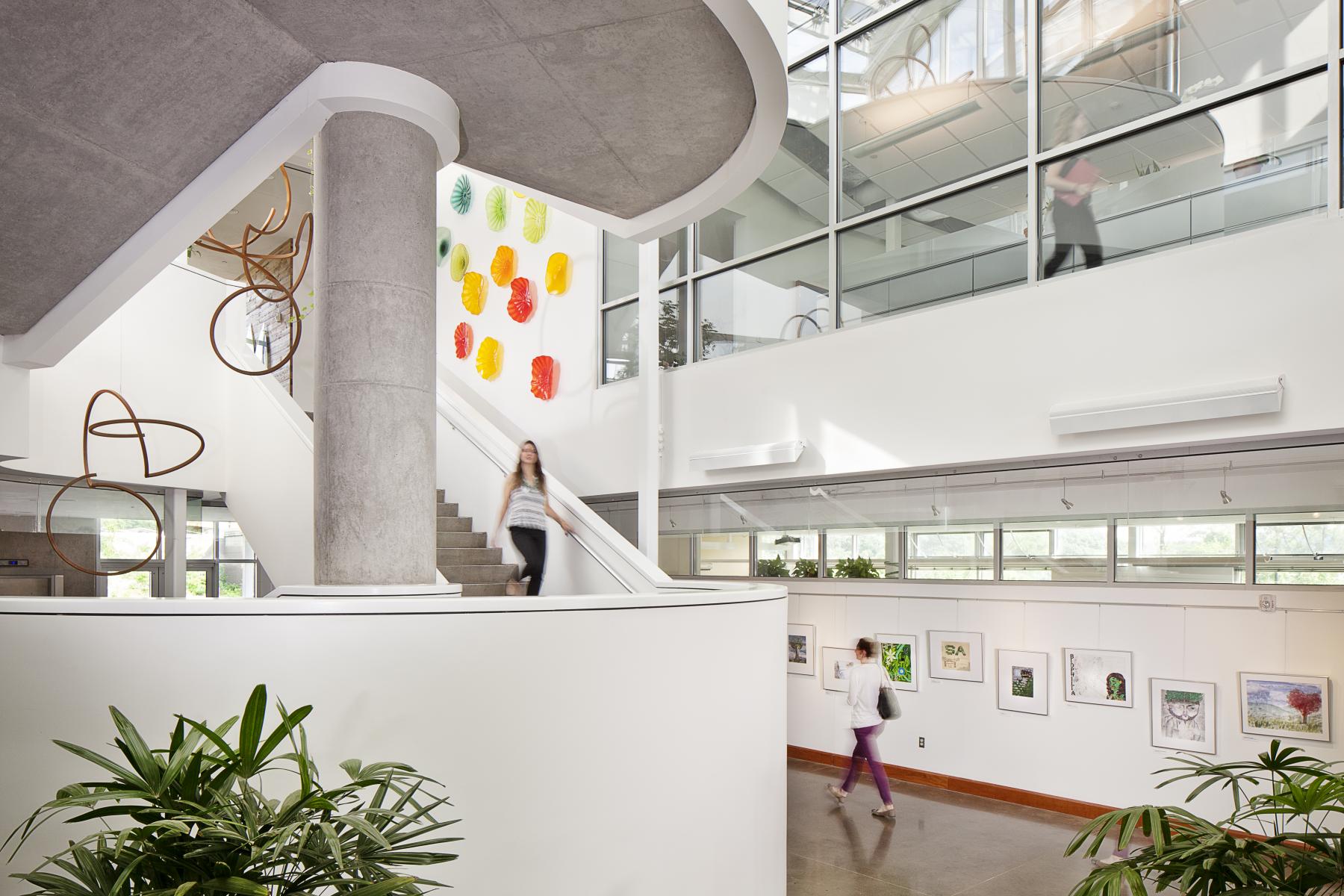 Photo above: Plants, art, and plenty of natural light enhance creativity and productivity among staff in the Center for Sustainable Landscapes. Credit: Denmarsh Photography, Inc.
Photo above: Plants, art, and plenty of natural light enhance creativity and productivity among staff in the Center for Sustainable Landscapes. Credit: Denmarsh Photography, Inc.
Phipps continues to lead the charge in sustainable construction with its latest project, the Exhibit Staging Center (ESC). Formerly a dilapidated public works building belonging to the City of Pittsburgh, the ESC has been transformed into a state-of-the-art, highly efficient facility, which also achieved WELL Platinum certification, to enhance the health and wellness of employees who use the space. Labor workers and grounds crew, a group whose well-being is often overlooked, will be the primary occupants of the ESC. All of Phipps’ staff will be able to utilize new features such as a 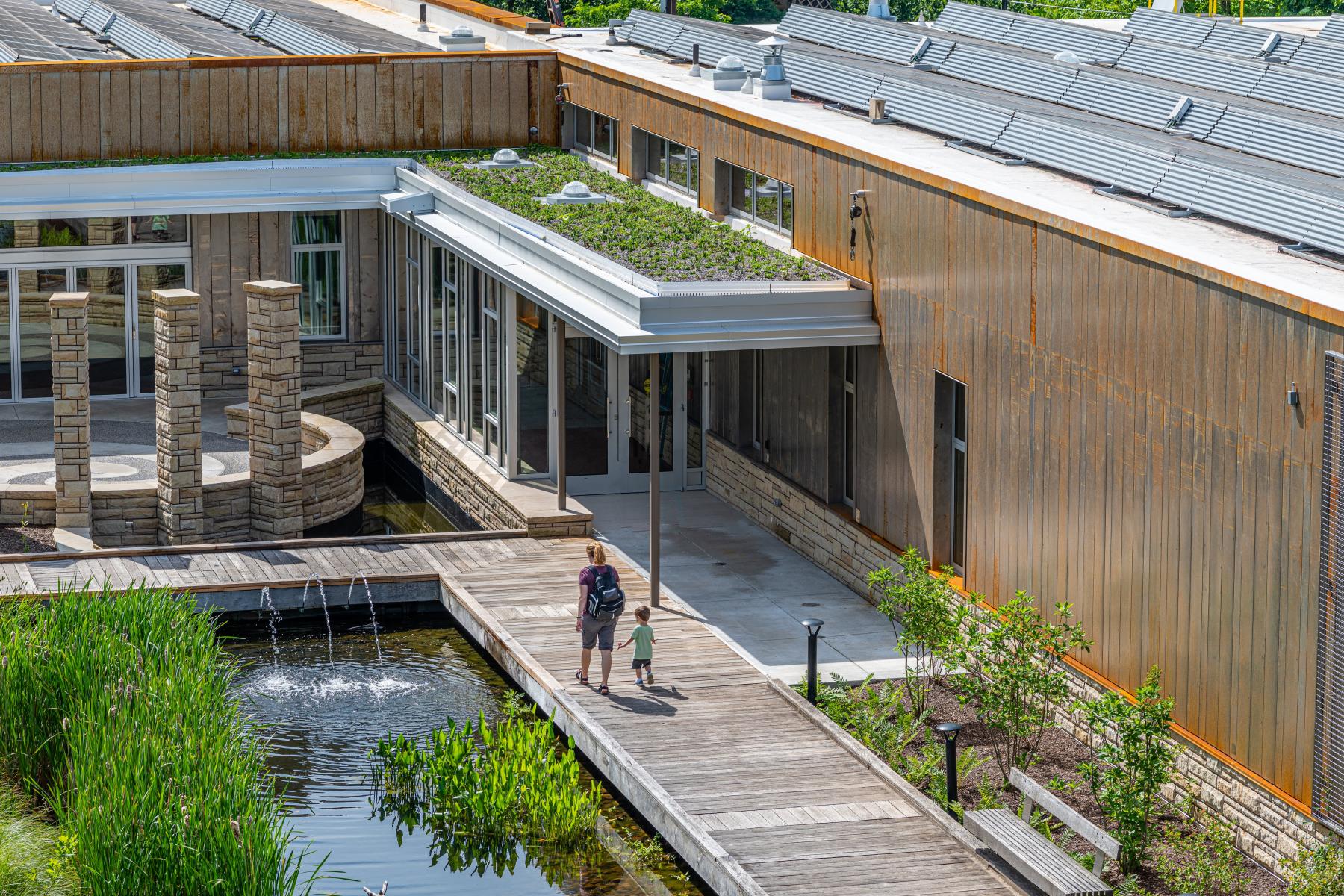 yoga studio, as well as fitness and meditation room to enhance staff mental and physical wellness. The yoga studio will also be available to hold community wellness programs. Upon the fulfillment of the Living Building Challenge’s one-year performance period, Phipps will have three International Living Future Institute certified projects on its site, each showcasing a different construction type (new, modular and retrofit).
yoga studio, as well as fitness and meditation room to enhance staff mental and physical wellness. The yoga studio will also be available to hold community wellness programs. Upon the fulfillment of the Living Building Challenge’s one-year performance period, Phipps will have three International Living Future Institute certified projects on its site, each showcasing a different construction type (new, modular and retrofit).
Photo above: Phipps' Exhibit Staging Center. Credit: Paul G. Wiegman.
The initiation of wellness programming at Phipps has resulted in programs touching on mind, body and environmental wellness, and impacting the daily work and quality of life for the organization’s 150-plus employees. These programs include:
- Meditation classes and resources
- Nutrition and dietary resources
- Monthly tea and snacks in employee breakroom
- “Freecycle” preowned goods upcycling exchange program
- Incentives to switch to green power at home
- Reimbursement program for the purchase of fuel efficient vehicles and bicycles
- Stress management resources
- Yoga classes
- Elimination of bottled water, unhealthy snacks and sodas from all staff meetings
- Organic apples made available daily in staff areas
- Personal nutrition counseling
- Provision of healthy recipes with activities and education on healthy and sustainable eating
- Standing desks and pedometers available to all employees
- A series of “Lunch and Learn” educational events which incorporate components from Phipps’ areas of focus
- Access to Café Phipps, an award winning café that offers vegan and vegetarian food, offers organic food, and avoids the dirty dozen fruits and vegetables most often contaminated with pesticides; No added sugars in foods, and no fried food, soda and junk food are permitted
- Phipps also seeks to improve the quality of life for staff by offering a robust package of wellness-related benefits. Staff at Phipps enjoy:
- Tuition-free adult education classes, including free cooking classes in Phipps’ new state-of-the-art teaching kitchen
- Tuition-free classes and activities for children
- An employee assistance program and travel assistance program
- Retirement planning, including a generous company contribution and access to financial planning resources
- “Biophilic Wellness Day,” a floating holiday for employees to enjoy a nature-related activity of their choosing
- Paid parental leave
- Insurance coverage with a large portion paid for by the company, as well as benefits including a gym membership program, access to health coaches, and wellness classes related to weight loss, stress management and other topics
Resulting from its commitment to environmental health and wellness, Phipps offers a 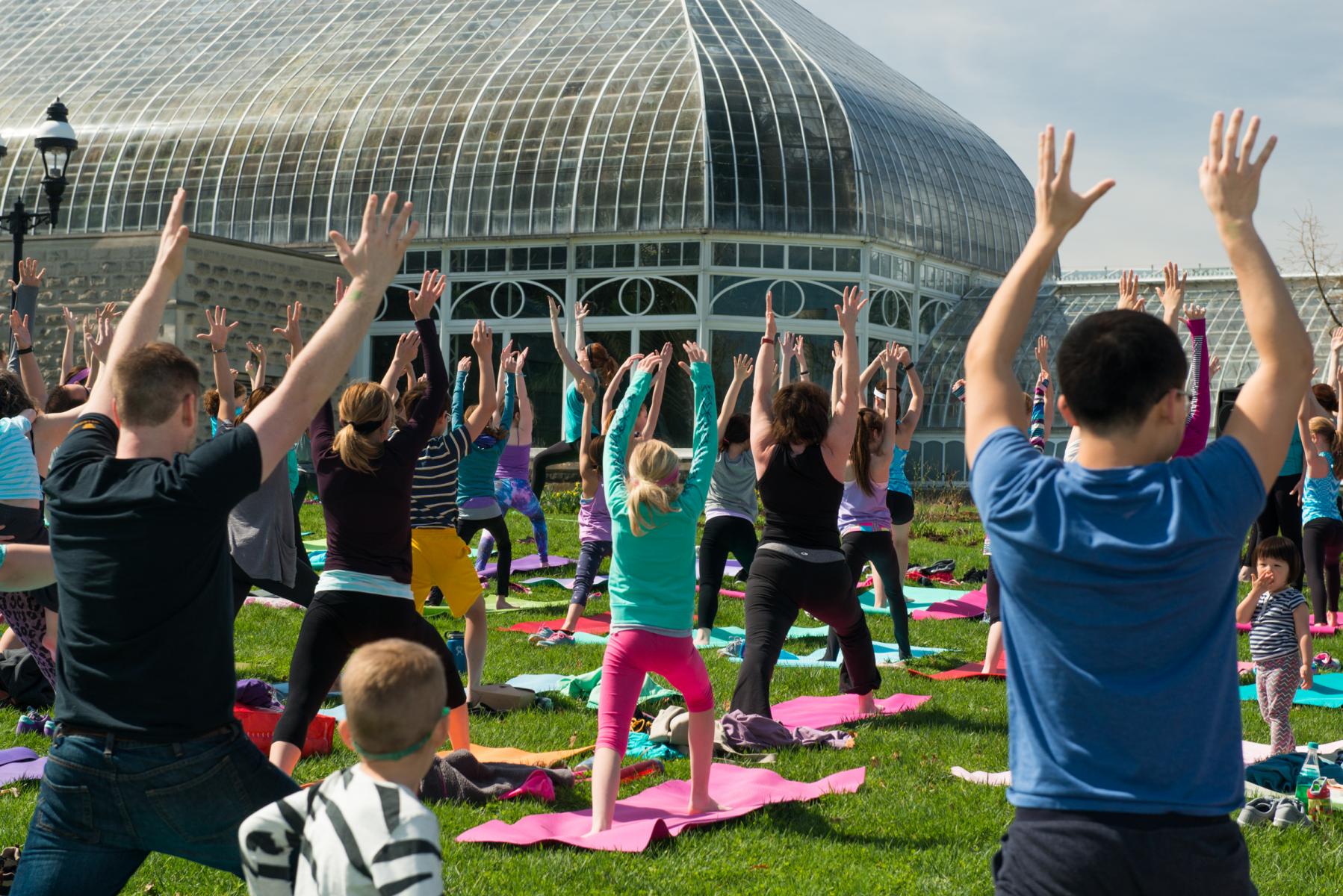 transportation incentive program to staff, which offers a reward for decreasing the company’s carbon footprint by using alternate means of transportation, such as walking, biking, utilizing public transportation or carpooling. Phipps also values professional development opportunities for staff, providing the support and resources to attend conferences and workshops, along with a reimbursement for continuing education.
transportation incentive program to staff, which offers a reward for decreasing the company’s carbon footprint by using alternate means of transportation, such as walking, biking, utilizing public transportation or carpooling. Phipps also values professional development opportunities for staff, providing the support and resources to attend conferences and workshops, along with a reimbursement for continuing education.
Photo above: Visitors enjoy a yoga class at Phipps. Credit: Kristi Hoffman.
While many components of Phipps’ programming and benefits are unique — from focusing on nature to integrating the office space — the most important of these is its potential for replication by others. Because Phipps receives over half a million visitors each year, and because these healthy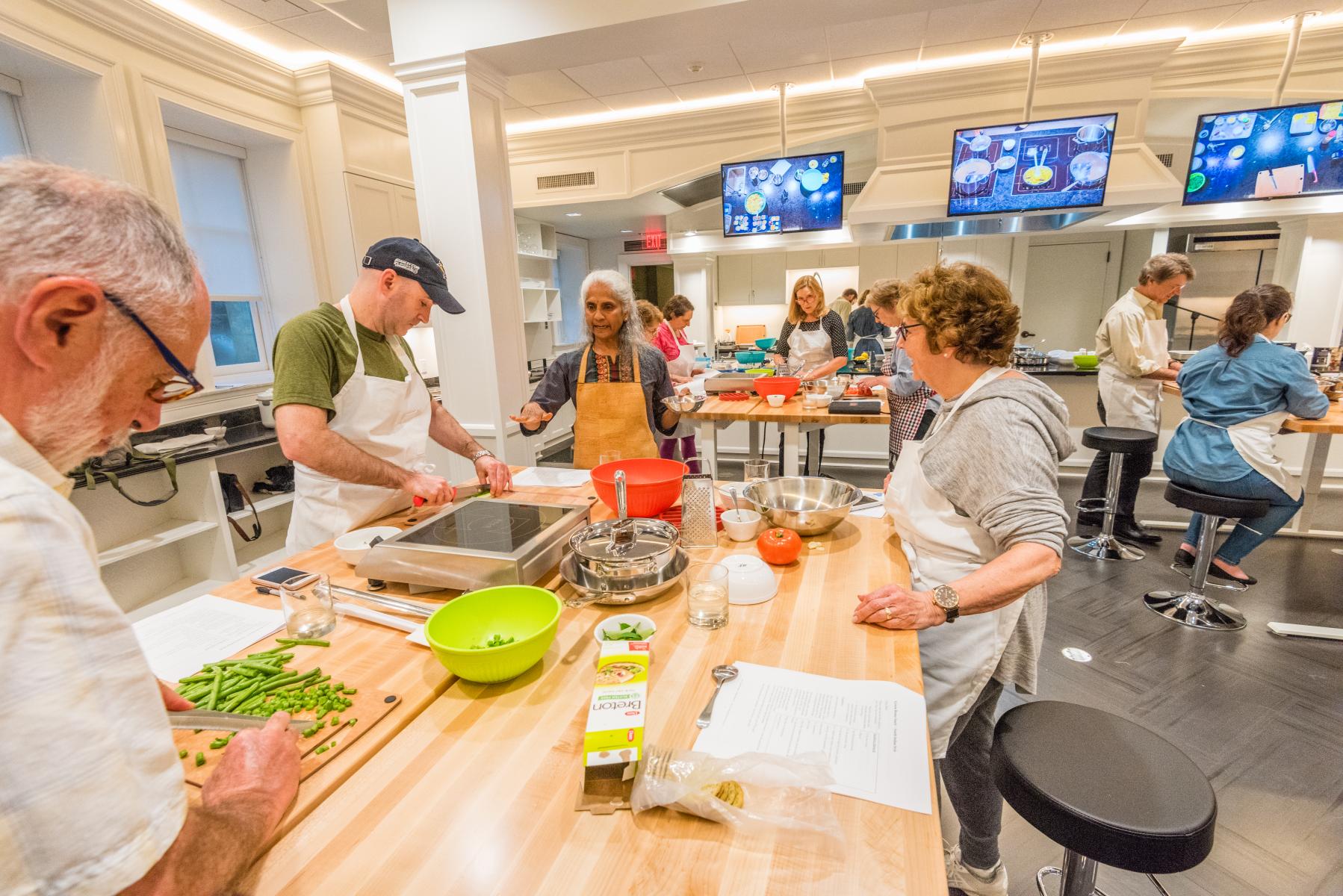 spaces are an integrated part of the visit, its staff, office and wellness program are publicly accessible. As a place to work, Phipps is a pacesetting model and learning tool, helping its employees and so many others to connect to nature and to live healthy and sustainably. By thinking in systems and leading with values, Phipps seeks no less than to plot a course for future workplaces to integrate nature into their efforts.
spaces are an integrated part of the visit, its staff, office and wellness program are publicly accessible. As a place to work, Phipps is a pacesetting model and learning tool, helping its employees and so many others to connect to nature and to live healthy and sustainably. By thinking in systems and leading with values, Phipps seeks no less than to plot a course for future workplaces to integrate nature into their efforts.
Photo above: Phipps' Demonstration Kitchen. Credit: Phipps' staff.
Phipps’ approach has always been based on the importance of “walking the talk,” not only for the benefit of Phipps’ own employees, but to lead by example in its region and industry, as well as in the world. The human resources department at Phipps exemplifies this thinking as it seeks to cultivate, maintain and support a diversified, productive workforce through policies, programs and initiatives that respect and reinforce the relationships between people, plants, the planet, health and beauty. In service of this goal, Phipps provides opportunities for employees to engage with nature, enjoy physical activity, attend classes on health and wellness, and access information on health and wellness during the workday. To ensure its support is both holistic and mission-appropriate, Phipps’ approach takes mind, body and environmental wellness into equal consideration and constantly searches for new points of intersection between them to increase employee awareness of the ways in which a commitment to one’s own wellness can benefit the natural world in complement. Specific programs include the robust benefits package offered to employees, including an Employee Wellness Program, as well as a commitment to building healthy spaces for employees and engaging in learning about and incorporating sustainability into their daily lives. Thanks to this approach, maintaining the health and well-being of staff at Phipps and empowering healthy change are goals that stand at the forefront of the organization’s programs.
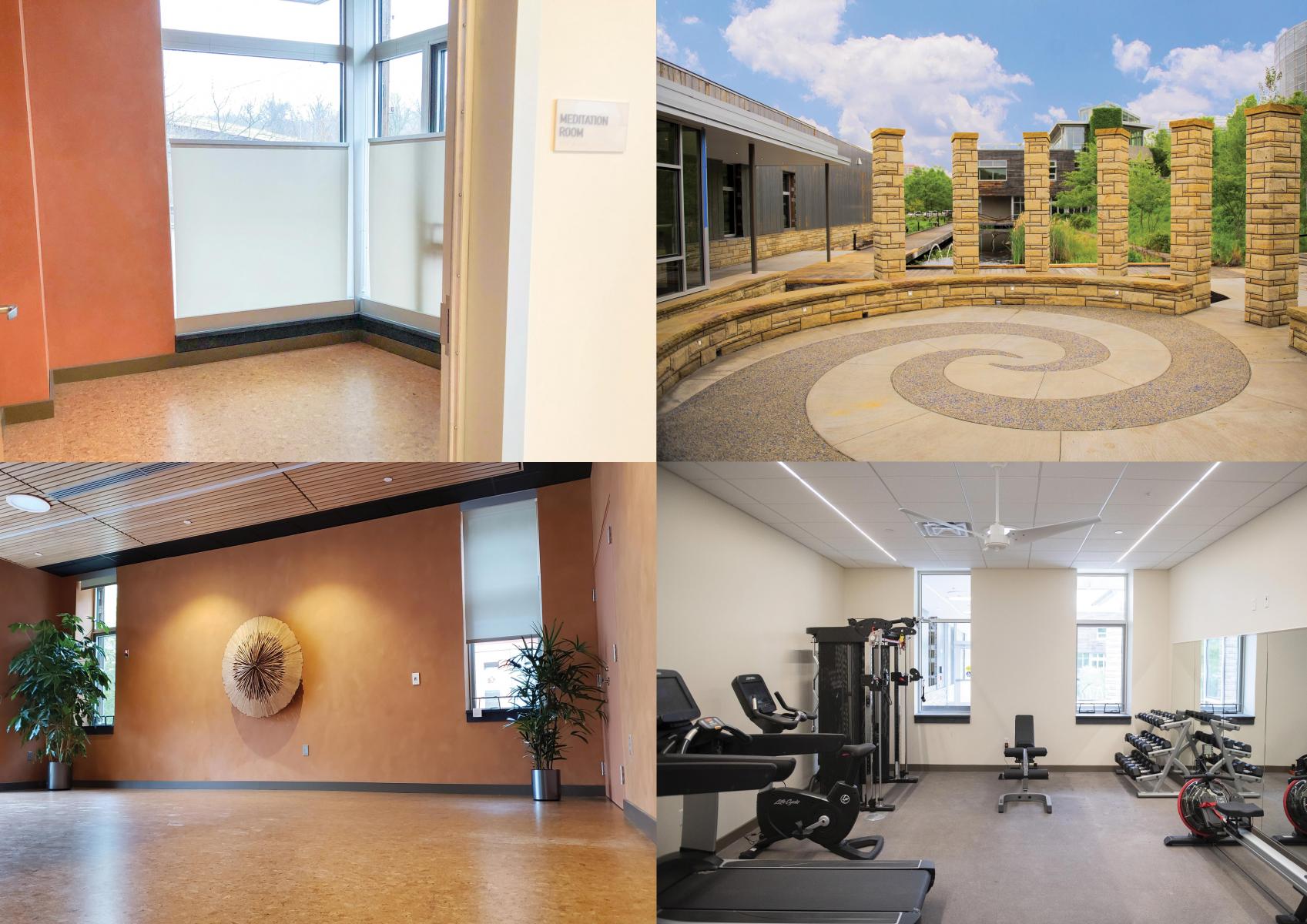 Photo above: Wellness spaces in Phipps' Exhibit Staging Center. Credit: Rob Larson Photography.
Photo above: Wellness spaces in Phipps' Exhibit Staging Center. Credit: Rob Larson Photography.



